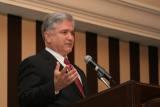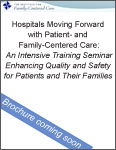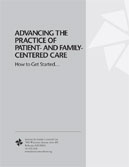| Jack Davis, President and Chief Executive Officer of the Calgary Health Region, Alberta, Canada |

Jack Davis, President and Chief Executive Officer of the Calgary Health Region (CHR) in Calgary, Alberta, Canada, was a keynote speaker at The 3rd International Conference on Patient- and Family-Centered Care in Seattle, Washington. To an audience of approximately 1000 people, Jack offered his perspective as the CEO of a large publicly funded health region committed to patient- and family-centered care.
Jack described two major events that occurred in Calgary -- the creation of a new Alberta Children's Hospital and a clinical tragedy -- that led to the same conclusion: We need to really listen to our patients and families.
Design of the New Alberta Children's Hospital
In 2002, the Calgary Health Region broke ground for a new Children's Hospital. Given the history of engaging families in advisory councils for pediatrics, the CHR included families and patients in the planning of this new facility. A family leader served on the project's steering committee. CHR sought input from not only parents of patients, but also from the patients themselves. According to Jack, the kids were told, "the sky is the limit" by the architects, and one young person involved in the process insists, "The entire architectural structure is completely different from the original plan just because of what the kids wanted."
Tragedy Strikes in 2004
In March 2004, a tragedy occurred at the Foothills Medical Centre in the Calgary Health Region: a medication error that led to the death of two adult patients. According to Jack,"this event sent shock waves through our system" which led not only to internal and external reviews, but also to a change in leadership attitudes from one of "blame, and shame" to "fix the flawed system." The leadership put a premium on listening rather than blaming; implementing structures to listen to and learn from staff, patients, and families; and decision-making that included the perspectives of patients and families. This change shifts the distribution of power, incorporating vital input from patients and families, both publicly and privately, which results in improved safety in the delivery of health care.
Creation of the Position of Patient Experience
Senior Vice President
In 2005, CHR added a new Senior Vice President of Patient Experience, reporting directly to President and CEO Jack Davis. The Senior Vice President, Dr. Bob Johnston, has a small and capable staff that talks with patients and families, individually and in committees, and champions system change to improve the patient experience.
The purpose of this newly created department, called a portfolio, is to enhance the experience of care by looking at the Region's services and facilities through the eyes of the patient and family. Read More...... You can listen to Jack Davis' remarks on-line.
|
| SAVE THE DATE ** MARCH 3-6, 2008 ** ATLANTA, GEORGIA |
Hospitals Moving Forward with Patient- and Family-Centered Care
An Intensive Training Seminar Enhancing Quality and Safety
for Patients and Their Families
Emory Conference Center Hotel
Atlanta, GA
With Leadership Support From Emory Healthcare
 The Hospitals Moving Forward (HMF) with Patient- and Family-Centered Care Seminar provides three and a half days of comprehensive, intense, and practical information designed to help hospital administrators, physicians, nurses, patients, and their families become effective change agents in their institutions and health systems. Attendees have the opportunity to explore examples of excellence and innovation in patient- and family-centered policy, programs, practice, professional education, and facility design in hospitals across the United States. The Hospitals Moving Forward (HMF) with Patient- and Family-Centered Care Seminar provides three and a half days of comprehensive, intense, and practical information designed to help hospital administrators, physicians, nurses, patients, and their families become effective change agents in their institutions and health systems. Attendees have the opportunity to explore examples of excellence and innovation in patient- and family-centered policy, programs, practice, professional education, and facility design in hospitals across the United States.
Attendees represent a broad range of health care disciplines and fields of interest and include health care professionals as well as patient and family leaders. This diversity is essential because only through collaboration among patients, families, health care providers, and administrative leaders will patient- and family-centered care become a reality. Seminar attendees will learn strategies to transform hospital systems to address the challenges and recommendations discussed in the Institute of Medicine's report, Crossing the Quality Chasm: A New Health System for the 21st Century. A series of sessions is planned for senior leaders.
The Hospitals Moving Forward Seminar will address many questions concerning the integration of patient- and family-centered care into your organization.
These include "How do you...
*Create patient and family advisory councils?
*Partner with patients and families in quality
improvement and safety?
*Support staff and physicians for change in practice?
*Support patients and families for shared decision-making?
*Change and improve rounds, nurse change of shift report,
electronic medical records, and measurement?
Assess your Hospital's Level of Patient- and Family-Centered Involvement:
Seminar faculty members will review your pre-seminar hospital self-assessment to determine where your organization is now. During the seminar, hospital teams will strategically design an action plan of your first -- or next -- steps. Opportunities to interact with other participants as well as individualized time with faculty, take-home resources, and post-seminar follow-up telephone technical assistance, make this process straightforward for you and your team.
Work with Renowned Leaders in the Field:
This seminar provides a unique opportunity for your team to work intensively with exceptional faculty, all of whom have extensive experience in advancing the practice of patient- and family-centered care. The faculty team brings many different perspectives, representing administrative leaders, physicians, clinicians, clinical managers, and patient and family leaders from both academic medical centers and community hospitals.
Create an Action Plan for Change:
Prior to the seminar, each team is provided with a comprehensive self-assessment inventory to determine priorities for change and improvement. Your team can use this self-assessment to guide individualized action plans that are developed at the seminar. Opportunities to interact with other participants as well as individualized time with faculty, take-home resources, and post-seminar follow-up assistance make this a dynamic learning and planning experience for you and your team.
Strategies to Build or Renew Partnerships with Patient and Family Advisors:
While you may have heard moving stories from patients and family members, at the seminar you will learn strategies to use the power of stories to enhance collaboration and bring about change in your organization.
Build Confidence in Your Abilities to Motivate Others into Action:
The Hospitals Moving Forward Seminar provides a fantastic opportunity to network and build relationships with those who can help you advance the practice of patient- and family-centered care. You and your team will leave with new skills, strategies, and tools to improve the quality of health care.
Receive Valuable Educational Resource Materials:
This is the only seminar of its kind. You will take home the in-depth Educational Resource Notebook and CD-ROM, included in the registration fee, which provides how-to processes and templates as well as Best Practices information. Learn about specific tools of the trade to make the journey easier.

On-Line registration will be available soon on our homepage at www.familycenteredcare.org.
|
| Meet the Staff: Marie Abraham, Senior Policy and Program Specialist |
Marie Abraham
 Meet Marie Abraham, the Institute's Senior Policy and Program Specialist. Marie joined the Institute in 1996, while working on her doctoral studies in leadership and training, with a special interest in newborn intensive care. She began as an intern working on a quality improvement project with the Vermont Oxford Network, and also worked part-time as the Institute's Information Specialist. Meet Marie Abraham, the Institute's Senior Policy and Program Specialist. Marie joined the Institute in 1996, while working on her doctoral studies in leadership and training, with a special interest in newborn intensive care. She began as an intern working on a quality improvement project with the Vermont Oxford Network, and also worked part-time as the Institute's Information Specialist.
Over her years with the Institute, Marie's role has grown. Marie:
* Serves as a faculty member for numerous national Quality Improvement Collaborative teams;
* Works as a consultant with many hospitals and health care systems; her specialties include newborn intensive care, maternity care, chronic illness care, and evaluation and research;
* Develops resource materials;
* Is a faculty member for the Institute's Hospitals Moving Forward Seminars; and
* Is a member of the planning team for the Institute's International Conference.
Marie's work as a faculty member/consultant for national quality improvement and collaborative self-management projects includes the Vermont-Oxford Network, an international collaborative committed to improving the safety and quality of neonatal intensive care, the National Initiative for Children's Healthcare Quality (NICHQ), and the Institute for Healthcare Improvement (IHI).
Marie served as faculty for the IHI Quality Allies Project, training teams of patients, families, and providers to break out of the traditional health care mold, to redesign ambulatory care practices, and to incorporate the principles of patient- and family-centered care for individuals with chronic conditions. Quality Allies focused on building partnerships to improve care for these individuals and provided training in collaborative self-management support, building confidence and competence of patients and families to manage their illness, make healthy lifestyle changes, and work as a partner with health care providers.
Marie is a member of the core faculty team and ongoing contributor to New Health Partnerships, a collaborative project which builds on the work of Quality Allies by providing virtual learning sessions for quality improvement teams that work to improve the quality of care for adults and children with chronic illnesses. In addition to her role as faculty, she has been instrumental in creating the website for New Health Partnerships, a project built and supported by individuals and organizations that believe that patients and families, in partnership with health care providers, can transform care for long-term conditions.
Marie brings a wealth of knowledge and experience to the Institute. Her educational background is in psychology, early childhood special education, and education and human development with a focus on infant and family development in intensive care settings. Prior to joining the Institute, Marie worked for ten years as a developmental specialist for infants, young children, and their families and as a trainer of trainers in the field of early childhood special education.
Marie lives in Connecticut. When she is not actively championing patient- and family-centered care, Marie enjoys spending time with her three sons, one of whom had special needs and required intensive therapy and early intervention services for his first six years. Marie is a voracious reader, and enjoys taking walks, and would love to return to quilting and yoga but just can't find the time.
|
|
 |
| Hot Topics: Helping Hospitals Get Started with Patient- and Family-Centered Care |
Advancing the Practice of Patient- and Family-Centered Care: How to Get Started . . .
 Bringing the perspectives of patients and families directly into the planning, delivery, and evaluation of health care, and thereby improving its quality and safety, is what patient- and family-centered care is all about. Bringing the perspectives of patients and families directly into the planning, delivery, and evaluation of health care, and thereby improving its quality and safety, is what patient- and family-centered care is all about.
Studies increasingly show that when health care administrators, providers, and patients and families work in partnership, the quality and safety of health care improve, costs decrease, and provider and patient satisfaction increase.
To truly be effective in enhancing quality and safety, patient- and family-centered care must be comprehensively integrated into organizational culture. For this reason, it is imperative that leaders at all levels have knowledge of the core concepts of patient- and family-centered care and ways in which they can support change.
The Institute for Family-Centered Care is pleased to offer guidance for how to get started in advancing the practice of patient- and family-centered care and in creating effective partnerships with patients and families with this new publication, Advancing the Practice of Patient- and Family-Centered Care: How to Get Started . . .
Part I provides a rationale for a patient- and family-centered approach to care and defines its core concepts.
Part II outlines steps a hospital can take to create partnerships with patients and families and offers practical suggestions for getting started.
Part III Where Do We Stand? provides an assessment tool to determine the degree to which patient- and family-centered approaches are embedded in the organizational culture.
Part IV Engaging Patients and Families: A High Leverage Tool for Health Care Leaders, is a firsthand account of one hospital leader's experience. Part V contains the criteria for the American Hospital Association's McKesson Quest for Quality Prize. This prize honors hospital leadership commitment to quality, safety, and patient- and family-centered care and efforts to systematically integrate this work. Part VI lists selected print and web resources.
Part VII Selecting, Preparing, and Supporting Patient and Family Advisors, offers practical guidance for beginning the process of identifying, recruiting, and sustaining the involvement of advisors.
Part VIII A Checklist for Attitudes About Partnering with Patients and Families, provides a tool for gathering information about the perceptions and attitudes of staff and administrative leaders.
Download Advancing the Practice of Patient- and Family-Centered Care: How to Get Started . . . and many other Tools for Change.
|
| Order Audio Copies of Presentations |
Miss the conference? Or were you there, but you would love to hear a presentation that you missed while attending another one? Or perhaps you want to share with your colleagues or family members what you heard at the Conference. There are many reasons why you might want to order the audio of some or all of The 3rd International Conference on Patient- and Family-Centered Care: Partnerships for Enhancing Quality and Safety.

There are several ways to order:
1. The easiest way is to use this link to order; or
2. Go to the Institute's homepage and, on the right side, click on ORDER AUDIO COPIES OF PRESENTATIONS; or
3. Click on the graphic of a CD at the bottom right side of the Institute's homepage.
NOTE:There are nine pages of presentations; click on the page number at the bottom of the page to view the next or previous page of the listing.
~ ~ ~ ~ ~ ~ ~ ~ ~ ~ ~ ~ ~ ~ ~ ~ ~ ~ ~ ~ ~ ~ ~ ~
Don't Forget to Save the Date March 3-6, 2008 Atlanta, Georgia Hospitals Moving Forward with Patient- and Family-Centered Care
An Intensive Training Seminar Enhancing Quality and Safety
for Patients and Their Families

~ ~ ~ ~ ~ ~ ~ ~ ~ ~ ~ ~ ~ ~ ~ ~ ~ ~ ~ ~ ~ ~ ~ ~
|
 |
|




 The Hospitals Moving Forward (HMF) with Patient- and Family-Centered Care Seminar provides three and a half days of comprehensive, intense, and practical information designed to help hospital administrators, physicians, nurses, patients, and their families become effective change agents in their institutions and health systems. Attendees have the opportunity to explore examples of excellence and innovation in patient- and family-centered policy, programs, practice, professional education, and facility design in hospitals across the United States.
The Hospitals Moving Forward (HMF) with Patient- and Family-Centered Care Seminar provides three and a half days of comprehensive, intense, and practical information designed to help hospital administrators, physicians, nurses, patients, and their families become effective change agents in their institutions and health systems. Attendees have the opportunity to explore examples of excellence and innovation in patient- and family-centered policy, programs, practice, professional education, and facility design in hospitals across the United States. 
 Bringing the perspectives of patients and families directly into the planning, delivery, and evaluation of health care, and thereby improving its quality and safety, is what patient- and family-centered care is all about.
Bringing the perspectives of patients and families directly into the planning, delivery, and evaluation of health care, and thereby improving its quality and safety, is what patient- and family-centered care is all about. 
